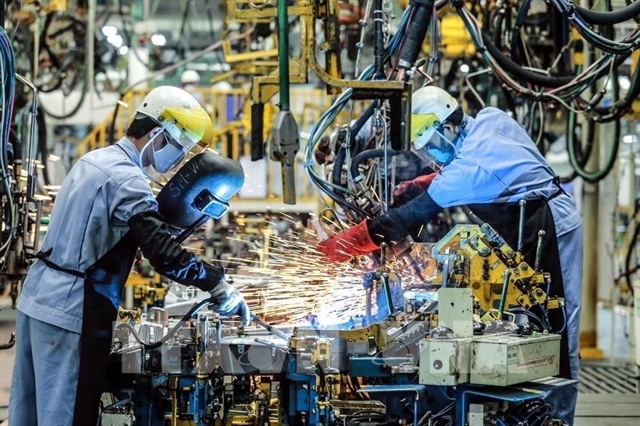 Economy
Economy


|
| A Toyota plant in Vĩnh Phúc Province. — VNA/VNS Photo |
HÀ NỘI — The automobile and motorbike supporting industries are likely to have opportunities to transform this year.
To integrate deeply into the global supply chain, Vietnamese businesses are being forced to improve their competitiveness, expand production scale and focus on technology.
Both the car and motorbike markets declined sharply last year.
The Việt Nam Automobile Manufacturers Association, which represents much of the auto industry, reported vehicle sales of 301,989, a 25 per cent decline from 2022.
Motorbike sales fell by 16.21 per cent to 2.51 million units. The plummeting demand for automobiles, leading to manufacturers and importers reducing numbers, had a significant impact on the supply chain.
Many Vietnamese supporting industry companies lost orders as a result.
Kinh tế Việt Nam (VnEconomy - Vietnam Economic Times) magazine quoted a Thaco Industries executive as saying the company’s revenues from auto parts sales were worth nearly VNĐ8.7 trillion (US$362.5 million) last year, down 20 per cent.
Exports fell by 75 per cent to $105 million, he said.
But the performance was "better" than that of many other businesses in the industry, he said.
According to the Việt Nam Association for Supporting Industries, supporting industry revenues could have fallen by 40 per cent last year.
Analysts said while the economy still faces potential difficulties this year, things would be much better than last year.
FDI would continue to rise this year, they said. The entry of new foreign companies would surely increase competitive pressure.
Motorbike companies such as Honda and Yamaha use more than 95 per cent locally sourced parts. Honda has an 83 per cent share of the motorbike market.
For years consumers have preferred domestically produced cars, since their quality matches imported products and prices are competitive.
In trucks, and agricultural and construction machinery, the localised parts rate is 15-40 per cent, rising to 70 per cent for some Thaco vehicles.
But in the case of sedans, the rate of local parts used remains below 20 per cent, with high-value components still having to be imported from abroad.
Experts forecast Việt Nam would remain a bright spot in FDI this year, especially “high-quality” investments. — VNS




